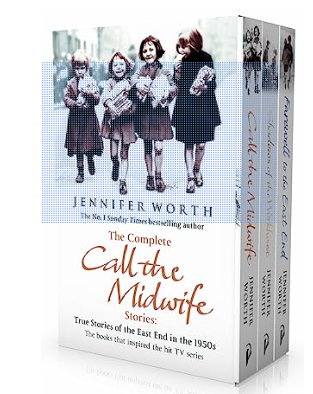Call The Midwife
A True Story of the East End
in the 1950s
Reviewed by
Geoffrey Sutton / suttong.com

I read Call the Midwife because I liked
the TV show, and my wife recommended the book. I’m a child of 1950s London and
grew up with stories from the old days. Both
of my parents are from large London families who survived both World Wars in the
city. They lived in small 19th century dwellings and other relatives
lived in multi-storey tenements built in the 1800s. So, for me, reading this tragic tale is a sort
of time travel. I’m from Islington and though I’ve walked the streets of Poplar,
experienced the blinding London smog, and wandered about the docklands on the
Isle of Dogs, I did not realise the extent of the poverty in the 1950s.
I also appreciated the snapshot of history—the time it
took to repair bombed out London. What a difference birth control has made! How
many opportunities are now open to women—I’m thinking of my
granddaughters—compared to my mother and those of her generation who were
middle aged during the 50s.
Sadly, women are still sexually exploited all over the
world. The author’s portrayal of a brothel appropriately evokes disgust. Her
description of the compassion of the women at Nonnatus house is amazing
considering many were born during, or not long after, the Victorian era. It’s also
encouraging to read about Christians busily meeting the needs of their
community rather than pontificating about how to live a righteous life.
I thought she did a credible job presenting the Cockney
accent. I suspect some readers unfamiliar with British English may have some
difficulties with other words and expressions. I hope readers will carry on by finding
meaningful connections to the people of London’s East End and the incredibly dedication
of the nurses and midwives who served them.
Finally, as a psychologist, I appreciated the inclusion of people who struggled with mental disorders at a time when effective treatments of mental illness were in early stages of development and largely unavailable.
Geoffrey W. Sutton, PhD is Emeritus Professor of Psychology. He retired from a clinical practice and was credentialed in clinical neuropsychology and psychopharmacology. His website is www.suttong.com
See Geoffrey Sutton’s books on AMAZON or GOOGLE STORE
Follow on FACEBOOK Geoff W. Sutton
TWITTER @Geoff.W.Sutton
You can read many published articles at no charge:
Academia Geoff W Sutton ResearchGate Geoffrey W Sutton

Comments
Post a Comment